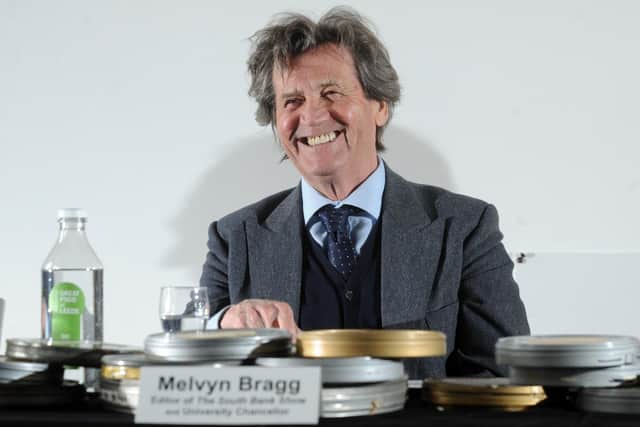Melvyn Bragg right to hit out at BBC's 'miserable' depiction of working classes: Jayne Dowle
But now he’s turned his pincer grip onto the BBC itself. He accuses the broadcaster of representing white working-class people only as “miserable, broke or in despair”. In an interview for the Radio Times, the former controller of Specialist Factual and Arts programmes at ITV talks of how the Corporation is alienating huge swathes of licence fee-paying viewers and listeners by pigeon-holing them.
I have to agree with The Lord Bragg (he was given a life peerage by Prime Minister Tony Blair in 1998), and here I am, the daughter of a steelworker, living in a town predominately white and working class. I might have a middle-class job, but I know when I’m being patronised.
I can barely watch the BBC these days.
Advertisement
Hide AdAdvertisement
Hide Ad

It’s not just the endless cop/drug/murder dramas that serve as ‘entertainment’, nor the screeching and shouting of EastEnders (which I haven’t watched for more than a decade, but occasionally catch by mistake). Nor the anodyne aimlessness of The One Show; even the theme tune sets my teeth on edge.
With the exception of the odd excellent series, and these two were both incidentally made here in Yorkshire - Happy Valley, starring Sarah Lancashire as the indomitable Sgt Catherine Cawood, and lately, quirky period drama The Gallows Pole, about West Yorkshire’s ‘Cragg Vale Coiners’, directed by Shane ‘This is England’ Meadows - there is far too much fodder riddled with lazy stereotypes and assumptions.
Recent BBC shows attempting to address ‘the working class’ include Freddie Flintoff’s Field of Dreams, in which the former England cricketer returned to his home town of Preston to seek untapped cricket talent.
The latter put me in mind of Our Dancing Town, when West End performer and choreographer Steve Elias rocked up to Barnsley in 2017, expecting oafs in pit boots clueless about the cha cha cha, only to find my home town has a long and proud history of dance, producing Royal Ballet performers such as Philip Mosley and Tala Lee-Turton, who danced with the Bolshoi.
Advertisement
Hide AdAdvertisement
Hide AdEven the BBC’s coverage of Glastonbury last weekend seemed bland and cookie-cutter; two young women in a series of nice dresses and a young man who bobbed up and down in the crowd like a demented work experience student determined to impress his bosses.
If that wasn’t irritating enough, the BBC’s ‘on demand’ Glastonbury coverage was maddening. I think the same work experience student had come up with infantile content headings such as ‘Pop Perfection’, ‘Guitars’ and ‘Hidden Gems’.
And don’t even get me started on the pitch of the BBC website; endless explainers in words of one syllable that would have been rejected by John Craven’s Newsround in the 1970s (when I was an avid fan) as too simplistic.
Whilst those bosses will no doubt swat away Bragg’s latest barb, they should take note. Bragg’s insightful comments add to a groundswell of opprobrium directed at ‘the Beeb’.
Advertisement
Hide AdAdvertisement
Hide AdIn May 2022, Liverpool-born Nadine Dorries, former Secretary of State for Digital, Culture, Media and Sport, suggested that the BBC had “almost forgotten” poorer towns and cities with big council estates and strong working-class communities.
She put forward future reforms, including an edict to the BBC to recruit at least 25 per cent of its staff from low socio-economic backgrounds, and focus production outside of the capital, but it’s all gone a little quiet since she lost her Cabinet job and ended up resigning as an MP.
Then in November, Ofcom found that the BBC “persistently under-serves” audiences on lower incomes and ordered it to tackle the imbalance.
We’re talking about a publicly-funded public service broadcaster which takes a £159 annual licence fee. The public, indeed, are right to ask if it is really serving their interests and ideals, or just its own woke agenda of London-centric cultural imperialism.
Advertisement
Hide AdAdvertisement
Hide AdDespite his credentials as an intellectual, as an influential – and occasionally derided – cultural figure for six decades, Bragg certainly knows what he’s talking about. Born in Wigton, Cumbria, where his parents ran a pub, his family tree reads like millions of others in the North; ancestors were agricultural labourers, coal-miners and worked in domestic service.
The TV licence fee is guaranteed until 2027, when the broadcaster’s charter is up for renewal. Who knows what will happen, but it’s certainly time for the BBC to listen more and preach less.